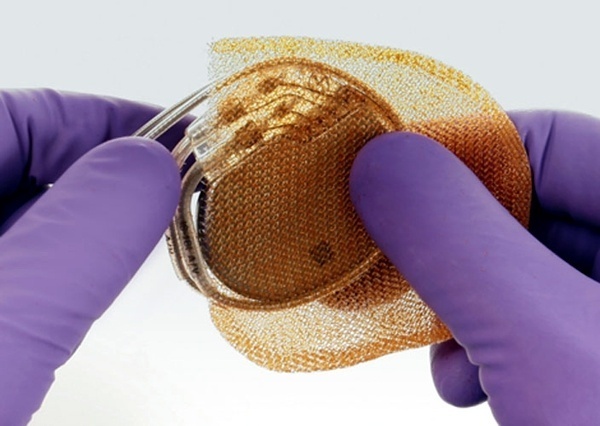
AIGISRx® is an Antibacterial Envelope that is made from knitted polypropylene mesh substrate, coated with a polyarylate bioresorbable polymer containing two antimicrobial antibiotics, minocycline and rifampin. AIGISRx is a dual component (resorbable and non-resorbable), sterile prosthesis designed to reduce infection and to stabilize the implantable pacemaker or defibrillator when implanted in the body.
According to the July 9 press release:
TYRX, Inc. announced today that it has received U.S. Food and Drug Administration (FDA) clearance to market the Fully Resorbable AIGISRx R Antibacterial Envelope for use with pacemakers and implantable cardioverter defibrillators (ICDs). The AIGISRx R Antibacterial Envelope received approval from Health Canada in January 2013.
AIGISRx R is a fully bioresorbable, antibacterial mesh envelope, intended to hold CIEDs securely in place in order to provide a stable environment when implanted in the body. Key to its design, AIGISRx R contains the antimicrobial agents rifampin and minocycline, which are released locally into the tissue, to help reduce surgical site infections (SSIs) associated with CIED implantation. Multiple studies have shown that in patients at high-risk for device infection, CIED implantation with the AIGISRx Antibacterial Envelope significantly reduced device infections by 70% – 100%, compared to patients who did not receive the AIGISRx.
“Over the last couple of decades, the number of cardiac device infections has risen sharply and out of proportion to the number of device implantations. With more than 500,000 CIED implantations annually in the U.S., it is imperative that infections associated with these types of procedures are avoided to save lives and money,” according to electrophysiologist Dr. Charles Love, Professor of Medicine and the Director of Cardiac Rhythm Device Services for the Division of Cardiovascular Medicine at The Ohio State University Wexner Medical Center. “The AIGISRx R provides physicians with a key technology to prevent surgical site infections following CIED implantation.”
Patients with SSIs following CIED procedures spend an average of two extra weeks in the hospital, undergo repeat surgical procedures to treat the infection, and cost the facility an average of $72,485. Additionally, such patients experience significant increases in morbidity and mortality, with 1-year mortality rates of 26.5 – 35.1%, and 3-year mortality of up to 50%, depending on device type.
“The AIGISRx R represents the next generation of TYRX’s Antibacterial Envelope technology, providing all of the advantages of the original AIGISRx, such as device stabilization and infection reduction, but now with the added benefit of being fully resorbable,” commented Robert White, TYRX President and Chief Executive Officer.
“Without question, FDA-clearance is a major milestone for TYRX and cements our leadership in the effort to reduce surgical site infections following CIED implantation. Our mission is to make the AIGISRx R a standard-of-care for all high-risk CIED surgeries where patients are especially vulnerable to the dire effects of an infection.”

